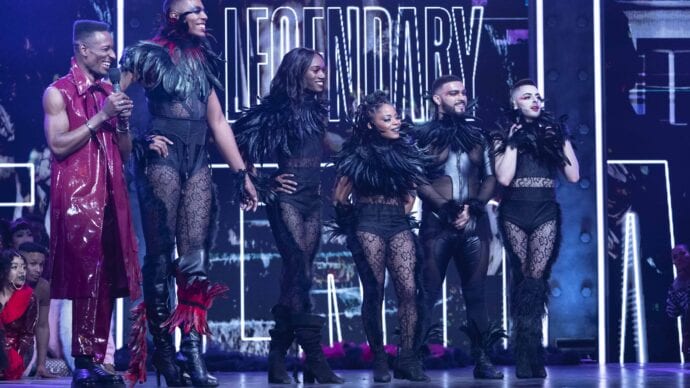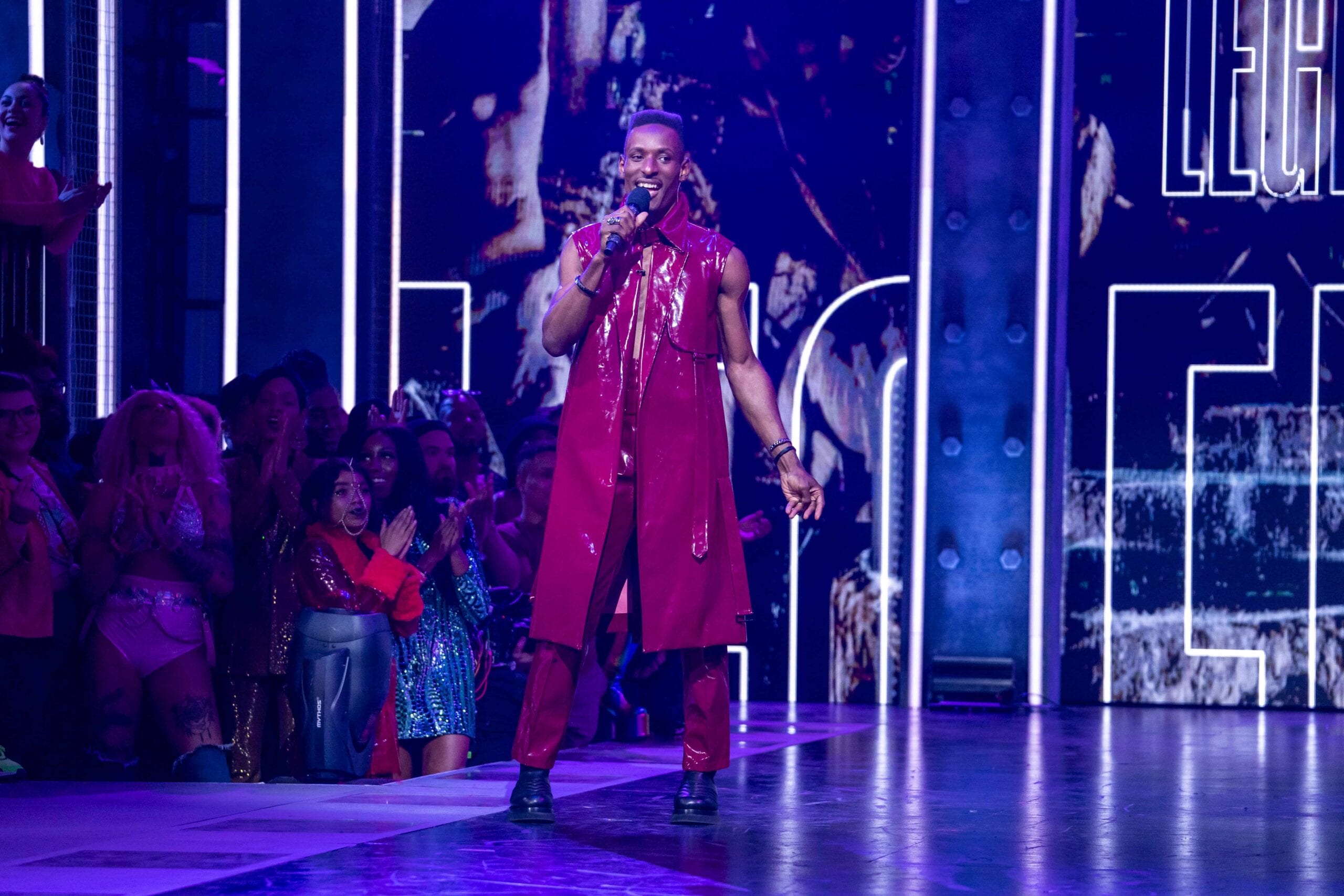When dancer and choreographer Dashaun Wesley first set foot in what he calls “the gigging world”—the community of dancers being paid for work—his style of dance, voguing, was seen as a specialty. General sentiment did not put it on the same level as other styles. “People used to say, ‘Oh, that’s a cute dance,’” Wesley tells me over the phone. He was sure to express the condescension of those folks. “This is just as much of a dance style as hip-hop,” he says. “This is just as much of me expressing who I am or what I’ve been through on the floor with music and a way of communicating and connecting.” Wesley is the emcee of Legendary, HBO Max’s new competition inspired by the ballroom scene where voguing originated. He has travelled the world spreading the gospel of vogue. Supporters of the style bestowed him with the moniker “King of Vogue.” But to whom much is given, much is required. “I’m not going to deny the title that people are giving to me,” he says, laughing. “But in order to take full responsibility, I must step up as an individual who is helping bring forth the scene. For me, it’s not so much about being the best voguer out there—it’s about making sure everyone is well connected and understanding of what this scene is and what this culture is all about.” Originally from Brooklyn, New York, Wesley first discovered voguing in the late 1990s when he was around 14 years old, hanging around New York City’s West Village on Christopher Street after school. One day, he ran into a DJ who was playing what he would come to know as vogue music on a speaker, as a crowd of people followed him Pied Piper-style. Wesley tagged along until they stopped at a pier. “They formed this circle and they pumped the beat and they started battling, and I was just like, ‘What did I run into?’” he recalls. “From that point forward, I went every day. I went back faithfully, and I was just like: This is something that I love watching and possibly want to do.” Already a hip-hop dancer, he says he “had a little groove” and a penchant for movement. He’d watch folks vogue on the pier and then go home and replicate it himself. As he began to make friends in the scene, he discovered the broader ballroom community and culture. Tracing its history back to the 1960s among queer Black and brown folk in NYC, the real-life ballroom scene is the inspiration behind Ryan Murphy’s popular TV series Pose (on which Wesley plays Shadow Wintour). Over the last 20 years or so, Wesley has not only become deeply involved with the scene, he’s become one of its chief products and purveyors. From (re)introducing voguing to the masses on MTV’s America’s Best Dance Crew and dancing/choreographing for Rihanna, to hosting balls and teaching classes as far away as Finland, Sweden, Russia and China, he’s done it all. In Legendary, members of different houses compete each week in ballroom categories for the $100,000 grand prize. They are judged by stylist Law Roach, rapper Megan Thee Stallion, actress Jameela Jamil and dancer (and ballroom icon) Leiomy Maldonado. Ahead of the series’ May 27 premiere, I spoke with Wesley about how he helped change voguing, its mainstream embrace and how his not-so-good experience as a contestant on America’s Best Dance Crew informs his role on the HBO Max series.
You’re part of a generation that changed voguing. What was the scene like when you first started?
Back then, we were part of a scene that was so underground you had to know someone in order to be involved, or know where it took place. I remember seeing people who looked like me and acted like me do these dances and these movements that I felt like I connected to. Once I found my way into it, there were two styles going on: This soft voguing dance style and there was this dramatic side. There were tons of people who would vogue soft and feminine. But me, I knew I had this edge and this fire to me that would be different from everyone else. There weren’t many dramatic voguers out there, but I just kind of knew my place. Once I got out there, people used to always tell me that I was stiff. But I knew I had this dramatic attack going on, that I wanted to release when I vogued.
How did you help shift the style of dance?
I helped change how people viewed dramatic back then. Because, again, dramatic was seen as just everyone throwing themselves everywhere and their body being flung all over the world. But if you have control and know how to shift your body and let it be read as an art rather than it being just a movement—that’s what I would say I contributed.
Talk to me about your time on America’s Best Dance Crew. I remember watching you and Legendary judge Leiomy Maldonado with your group Vogue Evolution.
We auditioned a couple times. We’d seen this group [on the first season] called Fysh N Chicks and they were doing Leiomy’s move [known as “the Lolly”]. So a group of us decided to sit down and figure out what we could do in order to help our community, because we were being seen but we weren’t being heard. When we first auditioned, we didn’t even make it. How they [eventually] showed us on TV was like, “Oh my God, another gay group,” or “They have a trans woman,” rather than them seeing what we were capable of.
Where did the name Vogue Evolution come from?
We knew that vogue was evolving and going to change because someone could see us in a completely different place. We kept auditioning because we knew we were ready for this, we were born for this—to make sure that people know where the culture came from. Also, we knew we were going to get this highlight and be seen. So why not make sure that it always gets zeroed back on to our culture, whenever you see it.
What from that experience informs you as you now come into the Legendary experience, 10 years later, when you’re no longer competing on the show but hosting it?
It’s such a moment. Me and Leiomy had our talks about how just 10 years ago, we were competing on a television show, trying to allow people to understand our culture, where it comes from, what we do, how we do it. Now, we get to sit behind the scenes and help create such an amazing opportunity. This is amazing because there are so many people, even going back to Paris Is Burning, who talked about what they wanted in life, what they wanted to do and what they wanted to be. The ballroom culture and the people who are a part of it, are continuing this legacy because we now have the opportunity to sit in these places that some people once never had the opportunity to. It’s shocking to be in this moment, to know that it can come full circle.
With this show and a show like Pose—is this the kind of future you were expecting when y’all came up with Vogue Evolution?
Definitely. I always say, there’s nothing more enjoyable than a notice that you exist. It’s so weird to know that celebrities can look at something and go, “Oh my God, I know this is the ballroom scene. That’s voguing.” I know how much we admire celebrities, but when they come back and tell us how much they’ve been watching us or how our creative competition moments have turned into them creating a new line, a new design or how they see how we take something and flip the eye about it, it’s that full circle that comes right back around. Legendary has provided us another opportunity, and it’s going to give everyone that chance to show what they have and what they can do and what they can be.
How did the opportunity for you to emcee the show come about?
It took about two years for this show to come together. In the beginning, I was on with my house as a competitor, because I’m a house father of the House of Lanvin for the west coast and also international chapters. But I didn’t want to take an opportunity away from someone else who’s never been through this and who would love this opportunity. I had the chance with Vogue Evolution to experience what it is to have the camera shoot you and judges ask you questions, where you’re performing with all your heart and they’re giving you a critique. As a commentator and an emcee, I figured I could use my voice because of my experience of this culture. The scout team agreed.

Dashaun Wesley (left) hosting episode 1 of “Legendary.” Credit: Courtesy HBO
Pose gives non-ballroom audiences a taste of the world, but it’s set in the ‘80s. Why do you think people should tune in to Legendary?
This is an opportunity for us to share what’s been happening in our culture and how we influence others, how we inspired others to even come up with the majority of things that are out there today. We have lingo that’s being used by so many different television programs and a lot of them don’t know the origin of it. This will give us the platform and the opportunity to share with others where things came from. Pose did give you a peek into what was going on in ballroom. What this does is let everyone know what’s happening right now.
And I know varying members of the ballroom community sometimes bristle at the idea of this underground world going mainstream. But you’ve been leading the charge, with Leiomy, over the last decade to bring it to the masses. How do you respond to those folks?
From the moment I saw Fysh N Chicks, I knew that it was going to happen anyway, that we were going to be exposed to the world. Years ago, we had VHS tapes that we were sharing amongst each other. VHS went to DVD. Now we have social media. We thought we were sharing videos amongst ourselves, but what we were doing was sharing everything that we had with the world, not knowing that they were watching. So this was bound to happen. We [need to] keep hold of what was so natural and so real to us. We must step up and be there when people have questions about things that they don’t know about our culture. Watch Legendary on HBO Max in the U.S. starting May 27; in Canada, episodes 1 and 2 premiere on May 27 on Crave, with new episodes airing on following Wednesdays. — EDITOR’S NOTE: This story was updated on May 26 to include Canadian streaming information.


 Why you can trust Xtra
Why you can trust Xtra


